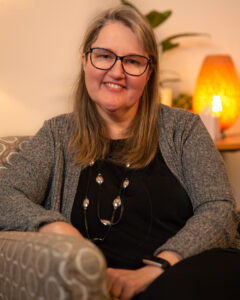
Belinda Seymour-Wright | Psychologist
Belinda Seymour-Wright | Psychologist
BA (Psych), BA Hons (Applied Psych), MEd Psych (Educational Psychology)
As a registered supervisor with the Psychology Board of Australia I enjoy supporting other practitioners.
I help adults with stress and burnout, anxiety conditions, depression, trauma, difficult relationships and enhancing personal growth. I particularly enjoy supporting people in their role as parents.
I enjoy working with couples on both parenting and general relationship issues. In my couple work I draw heavily on the work of the Gottman Institute. The transition to parenthood can be particularly stressful, and I enjoy supporting individuals and couples with this.
My endorsement is in Educational and Developmental Psychology and have enjoyed working with children and teens throughout my career. Often the most effective ways I can assist children, is through working with and through their parents or caregivers. Areas of work include helping young people and children learn to manage difficult emotions and behaviour; challenging behaviour in toddlers, pre-schoolers, children and adolescents, ADHD, behavioural problems, depression and anxiety.
My initial experience was in South Africa, in employee assistance programs, community settings, a large NGO and private practice. In New Zealand I oversaw the implementation of a range of evidence-based approaches for children and teens with challenging behaviour and high levels of trauma. Since moving to Melbourne in 2018 I have been in general practice working with a wide range of ages and presentations.
Approaches include: Cognitive-behavioural therapy (CBT), Trauma-focused CBT, EMDR (Eye Movement Desensitization and Reprocessing), Dialectical Behaviour Therapy (DBT), Acceptance and Commitment Therapy (ACT) and other mindfulness-based approaches, Interpersonal Psychotherapy (IPT), as well as social learning theory-based approaches to parenting (e.g. Triple P and The Incredible Years)
Languages: Ek is redelike vlot in Afrikaans as u meer op u gemak is in u eie taal.
An interview with Belinda Seymour-Wright
Why did you become a psychologist?
I decided to become a psychologist because of suggestions by friends in high school. I really enjoyed listening to people in depth, getting to know them, finding out what they wanted, where they wanted to go, what made them hopeful, what helped them to carry on. So it just seemed like a really good fit.
What are you passionate about in Psychology?
At the moment, and probably for the last 10 years, a lot of different fields such as neurobiology, behavioural science, the scientific study of mindfulness, a whole lot of things are coming together with traditional psychology to really understand what it means to be human, where we get stuck and how to get unstuck. So that’s really exciting to see that coming together and then take and share that information with clients. I really enjoy that.
What gives you a sense of satisfaction?
I often think that therapy is going best when the client is talking much more than I am to really get in touch with their true self, with what they really want in life, having that space to be heard, to find what it is they want and how to get there, how to get unstuck from what’s keeping them stuck – with some support and help from me. And obviously I love to see people progress, get better and all of those things that we all love to see and clients want for themselves.
What can a client expect in their first session?
So when you come to the first session, what I’m going to try and do is get to know you a little, it’s just a snapshot but I try and get a sense of where you’re at. Most importantly, why you’ve come to see me and what you’re hoping for, what your goals are if it’s specific, or if it’s a little bit more vague, you might need to figure out what it is exactly you’re hoping for from the session. Usually by the end of the session, I like to have some sense around how we’re going to work together at least initially. Hopefully one or two ideas that can help you feel a little better. The first session is also very importantly a chance for you to get to know me, see my style a little and get a sense of whether I’m someone you can work with. Because I’d much rather at that point in the therapy clients say to me, ‘Oh, I don’t think this is a fit’, and we figure out what went wrong and find someone that’s going to be a better fit for them.
